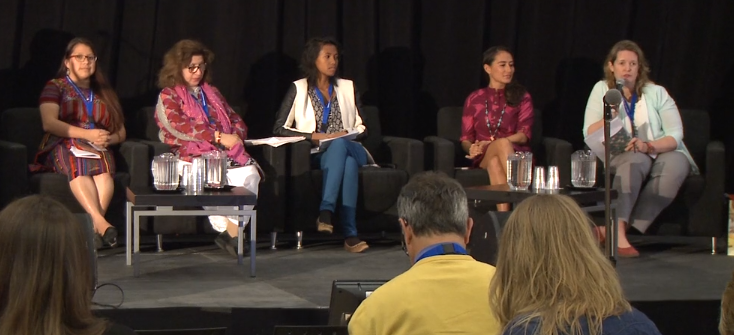03 Apr The Importance of Women in Sustaining Livelihoods and Natural Resource Management

In many nations – particularly those which are considered to be developing or affected by conflict, it has been found that women are often primarily responsible for ensuring their household needs (such as access to potable water, food, and energy) are being sufficiently met. As such, they play a critical role in the management and use of natural resources. However, as emphasized by the speakers who contributed to this session; there is still a concerning lack of understanding regarding the notable impact women can have on the policy development and implementation process within their respective communities, and beyond. In appreciation of this, a discussion of comparative traditional and/or cultural gender relations and dynamics of power (which limit potential female participation in governance) is provided through personal accounts by women hailing from Madagascar, Guatemala, Hawaii, and Pakistan.
An emphasis is placed on the need to push toward equal recognition of women’s knowledge and capacity to contribute to sustainable development and natural resource management. As human and environmental well-being go hand in hand, it is important to recognize that policies which consider the interests of both spheres simultaneously are more likely to be effective in the long-term -and to be well regarded by local communities. Therefore, active participation of all demographics, including females, in sustaining livelihoods and natural resource management can only lead to a more rich set of perspectives and priorities in the decision making process.
Key Themes:
Engagement, Education & Empowerment, Factors of Success in Community Conservation, Livelihoods, Governance, Rights & Conflict, Conserved Areas
Panelists:
Shaelene Kamaka’ala, from Hawaii, jointly founded the Kahana Kilo Kai program for grassroots and community-based ocean monitoring, and is currently a Community Based Fisheries Area coordinator.
Meher Marker Noshirwani (Pakistan) works in the field of women, development, environment and climate change, and is the Regional Vice Chair for Asia of the IUCN’s Commission on Environmental, Economic, and Social Policy (CEESP).
Vatosoa Rakotondrazafy (Madagascar) has a particular interest in ocean governance, indigenous communities and human rights defense. She focuses on coastal communities as the future of the fisheries in Madagascar, and currently coordinates Madagascar’s LMMAs (Locally Managed Marine Areas) Network.
Yeshing Juliana Upún Yos is a Mayan Kaqchikel woman from Guatemala. She focuses on the collective rights of Indigenous Peoples, especially as they relate to natural resources and sustainable development, with a focus on biodiversity conservation based on traditional knowledge.
Discussion Facilitated by Kristen Walker-Painemilla (Chair, IUCN Commission on Environment, Economics, and Social Policy (CEESP))


